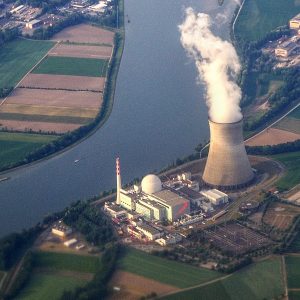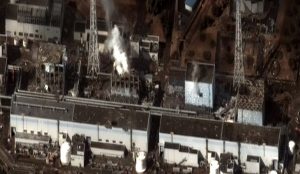Australia is currently in the midst of an energy crisis. Electricity prices have risen significantly as coal-fired power plants around the country are shutting down, lowering electricity supply in a time where demand is skyrocketing.
As Australia is exploring new ways to generate clean and efficient electricity, one possible, yet controversial alternative have been proposed: nuclear power.
Nuclear power generates electricity by splitting radioactive isotopes, such as uranium-238, in a process called nuclear fission. The heat produced from this process is then used to heat water, which turns into steam and spins turbines to generates electricity.

Nuclear power plant. Source
Proponents of nuclear power argue that nuclear power is a clean and efficient energy source. Unlike fossil fuels, nuclear power generates little to no greenhouse gases. This makes nuclear energy a viable option for combating climate change and can help lower carbon emissions in Australia, allowing the country to meet its emission goals.
Another advantage of nuclear power is its reliability. Nuclear power plants are reliable because they can provide a consistent and reliable source of electricity as nuclear power plants require less maintenance and are designed to operate for long periods before refueling. This is in contrast to renewable energy sources such as wind or solar, which are less reliable as they are dependent on fuel availability (wind and sunlight) and require large-scale storage.
Despite the benefits of nuclear power, there are opponents who raise concerns about its safety. One reason behind this opposition is the potential for accidents. Nuclear meltdowns such as Chernobyl and Fukushima Daiichi have resulted in radioactive leaks and serious health risks for people living nearby. In fact, the areas surrounding these accidents sites have been left uninhabitable for the foreseeable future.

Damage to the Fukushima Nuclear Power Plant following the 2011 earthquake and tsunami. Source.
Another risk associated with nuclear power is the issue of nuclear waste. Nuclear power plants generate radioactive waste that can remain hazardous for thousands of years.
Radioactive waste generated from nuclear power plants poses a risk of environmental contamination, causing harm to people, animals, and the ecosystem. This waste needs to be carefully stored and disposed of to prevent contaminating the environment.
The debate over nuclear power is likely to continue for many years to come. While there are certainly benefits to nuclear power, it is also clear that there are associated risks. As Australia faces the current energy crisis, it should consider nuclear power as a viable option for generating electricity to overcome this crisis.
~ Raymond Tang

Great blog post! I think it was written with a generally scientific intended audience. And in a journalistic style due to the inverted pyramid structure. I wonder if there are ways to prevent nuclear meltdowns with more advanced technology we use today.
Great summation on the controversy surrounding nuclear power. I think I read an article on nuclear power that consumes the waste produced by other power plants, but I cannot remember the title. I look forward to a greater advancement in nuclear technology to make it more clean, nuclear is the closest thing to the energy of the future.